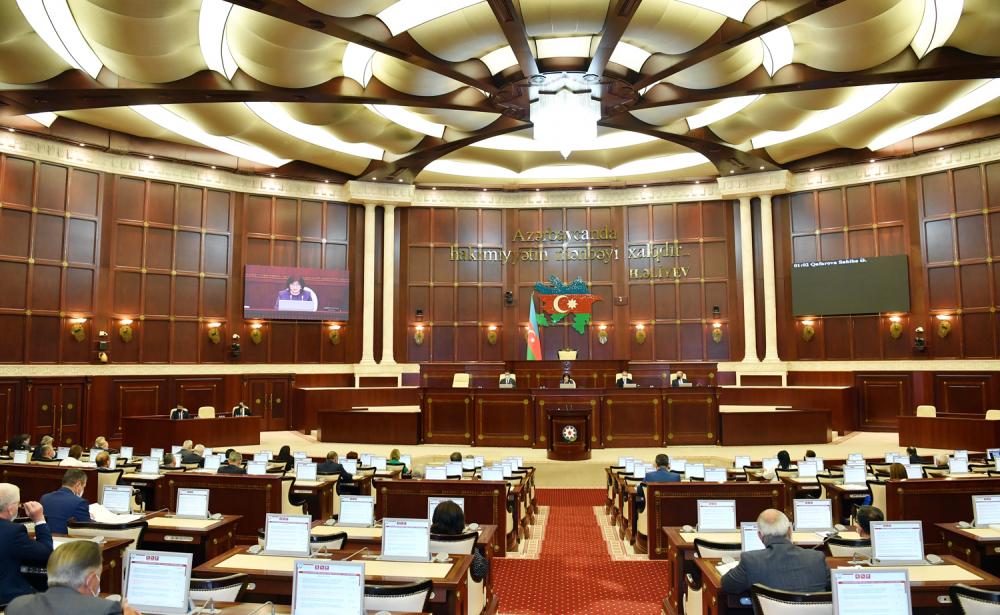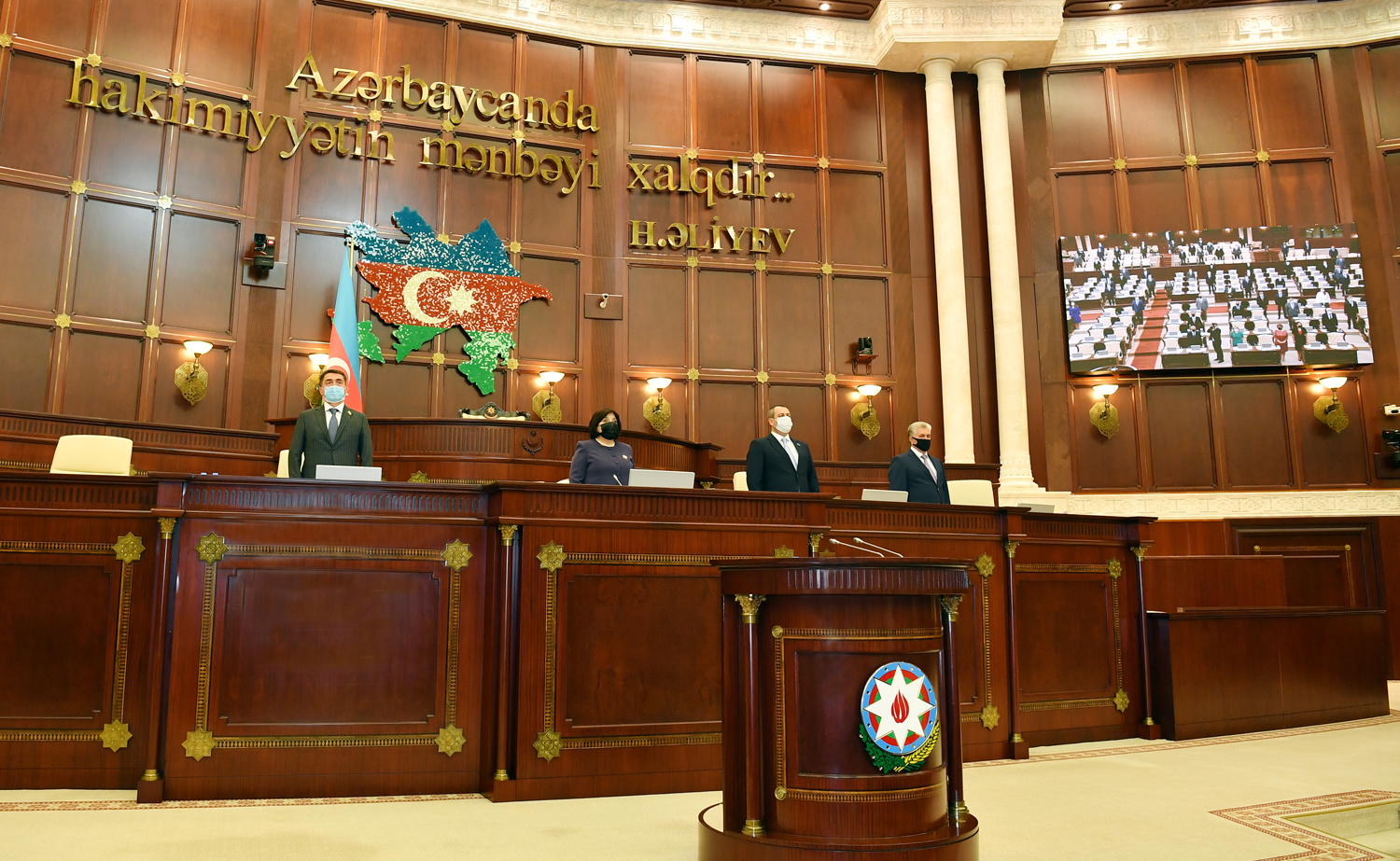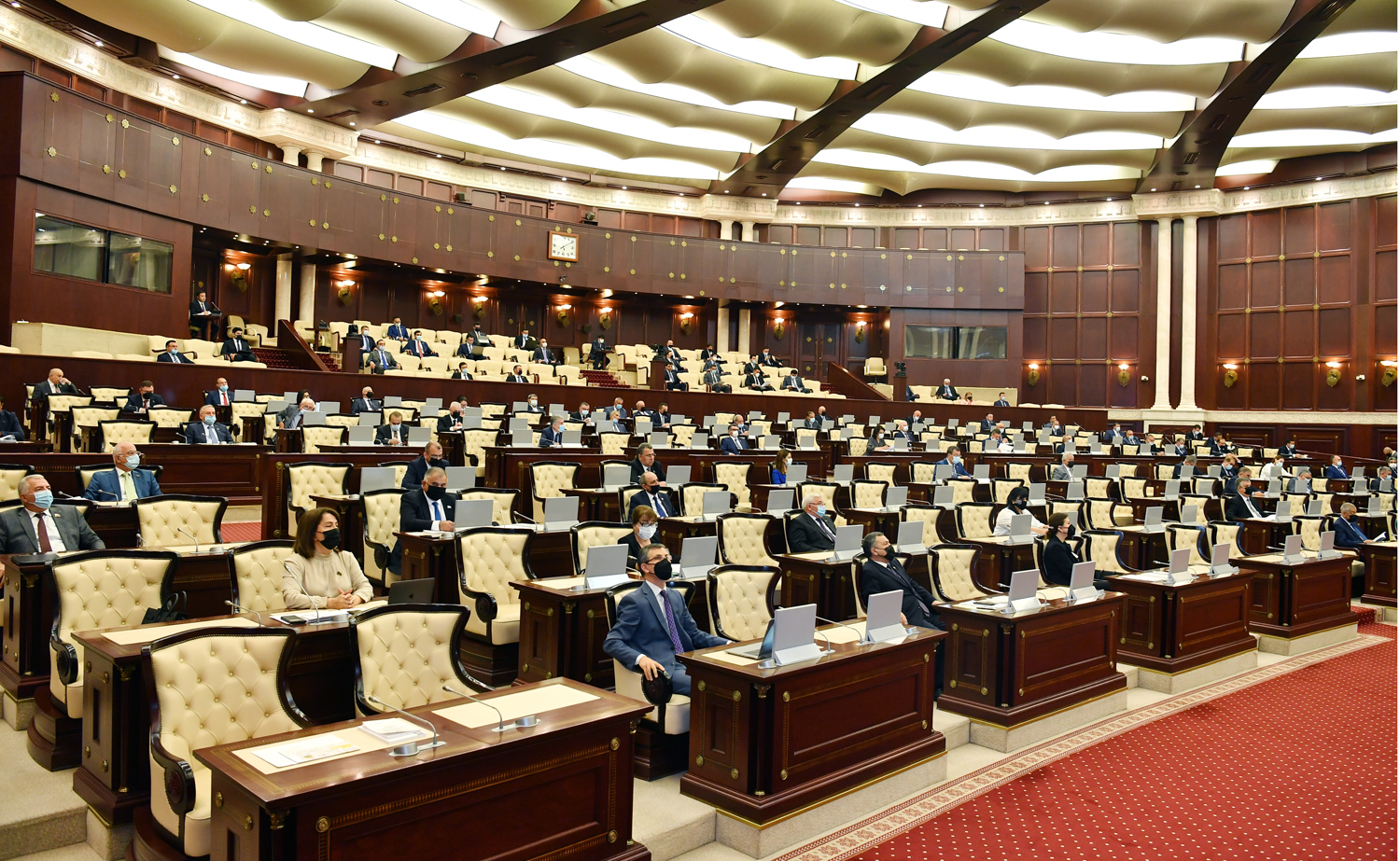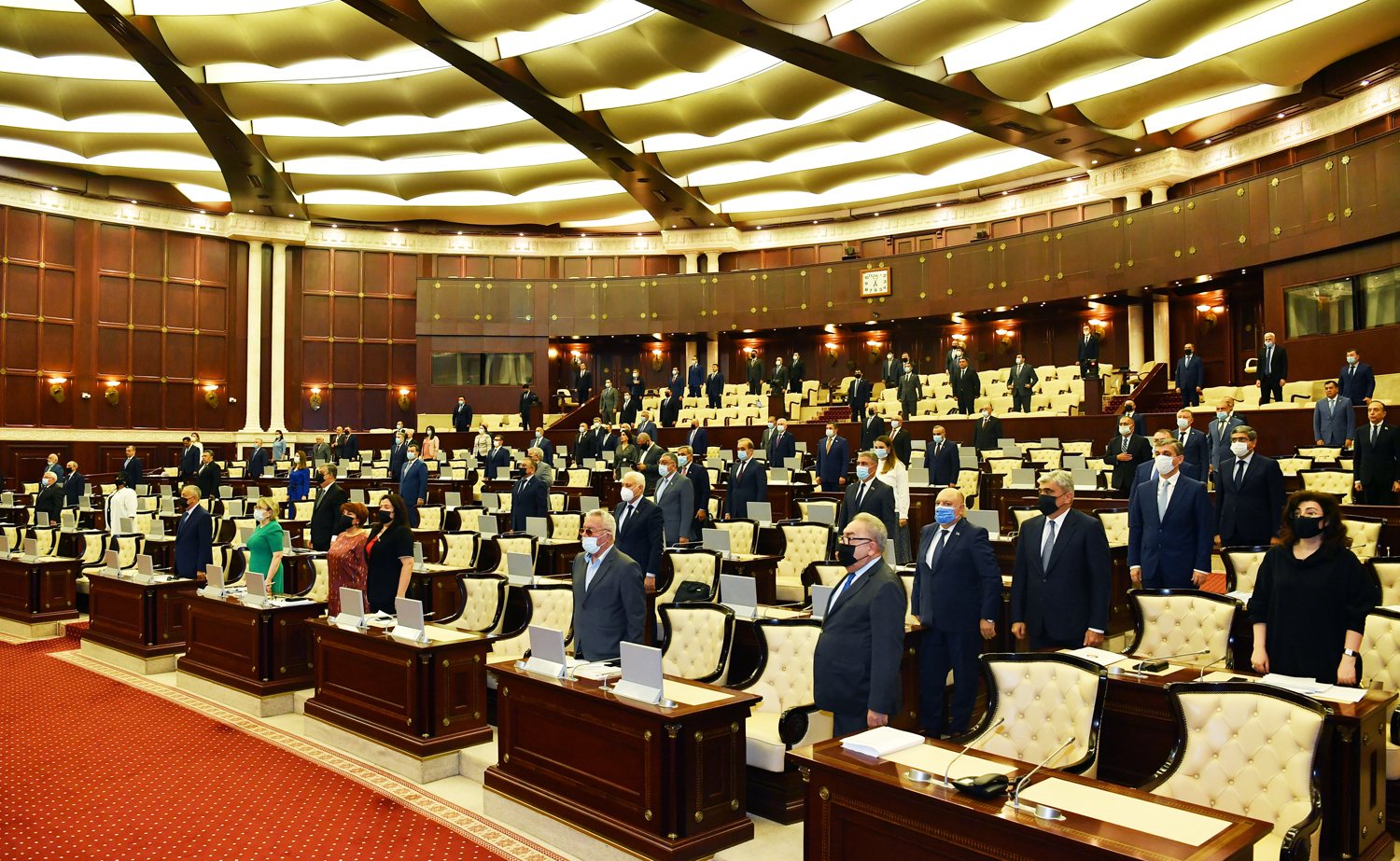Extraordinary Session of Milli Majlis Has Begun

The 6th session of the sixth-convention Milli Majlis started under the chairmanship of Speaker Sahiba Gafarova on 8 June.
The Chair of the Milli Majlis declared the session open; the National Anthem of Azerbaijan was sounded.
As the opening of the session proceeded, the Chair of the Milli Majlis gave her account of the Azerbaijani parliamentary delegation’s travel to Pakistan on 31 May to 4 June: the working trip of 1-2 June and the official visit of 3-4 June.
Sahiba Gafarova told of the 2nd General Conference of the Parliamentary Assembly of the Economic Co-operation Organisation (PAECO) held in Islamabad first. She reminded the MPs that the ECO was a regional economic forum uniting the following ten states: Azerbaijan, Afghanistan, Iran, Kazakhstan, Kyrgyzstan, Uzbekistan, Pakistan, Tajikistan, Turkey and Turkmenistan.
At the events beginning with speeches by the chairs of the national parliaments of the member-states, the Chair of the Milli Majlis told the participants what tremendous importance Azerbaijan attached to furthering its relations with the influential international entities including the Economic Co-operation Organisation. She also said to them that we considered that it was the call of the time to deepen the versatile co-operation amongst the ECO members.
There was an exchange of opinions at the conference about promotion of parliamentary partnership in the name of regional integration. During it, the leader of the Azerbaijani parliament touched on the role of interparliamentary co-operation and parliamentary diplomacy in finding common approaches to solving the global problems challenging the world community at present. Madame Speaker pointed out that strengthening of integration processes amongst the member-nations would promote a more rational use of the rich natural resources, transport capabilities and intellectual potentials of our regions. Sahiba Gafarova informed the House that she had placed a special stress on Azerbaijan having been able to see successful regional projects carried into life and to become a key partner in energy security maintenance and diversification of energy resource supply routes despite facing the Armenian occupation for close to thirty years. Azerbaijan ended the Armenian occupation and made its national territory whole again at the curtain drop of last year. That opened new opportunities for economic integration in the region. Large-scale restoration programmes for the de-occupied provinces are under way currently, Madame Speaker continued her speech in Islamabad, noting further that companies from a number of countries, predominantly, those friendly to Azerbaijan, were involved in the restoration and rebuilding operations.
Then, Madame Chair informed the House of a meeting of women parliamentarians held at the conference; she said she had chaired the first session of the meeting.
There were thematic panel discussions at the conference; the members of the Azerbaijani delegation took part in them.
President Mr Arif Alvi and Prime Minister Mr Imran Khan of the Islamic Republic of Pakistan met with the leaders of the national parliamentary delegations separately during the conference. Then, they spoke before all the delegations.
The Azerbaijani parliamentary delegation conducted a number of bilateral meetings while in Pakistan as well. In the opinion of Madame Chair, the conversations they had with Chairman of the Great National Assembly of Turkey Mr Mustafa Şentop, Chairman of the Legislative Chamber of Oliy Majlis of Uzbekistan Mr Nurdinjon Ismoilov and Chairman of the House of the People of the National Assembly of Afghanistan Mr Rahman Rahmani were very important for the progress of interparliamentary co-operation.
Each attending delegation was made aware of the almost thirty-year occupation of our lands, destruction of our towns and villages by the Armenian vandals during the occupation period, Azerbaijan having ended the occupation and restored its territorial integrity during the 44-day Patriotic War and the post-war refusal of Armenia to make minefield maps available – the refusal that leads to the deaths of our servicemen and civilians in mine explosions.
The conference culminated in the signing of the Islamabad Declaration the postulations of which demonstrate once again the member-nations’ shared intention to further partnership and co-operation processes in our regions.
The Chair of the Milli Majlis underlined the success of the official visit of the Azerbaijani delegation to Pakistan. During it, the delegation called at the Embassy of Azerbaijan in Islamabad: the Great Leader Heydar Aliyev was commemorated; flowers were put at his bust.
‘We had fruitful meetings with President of the Islamic Republic of Pakistan Mr Arif Alvi, Chairman of the National Assembly of Pakistan Mr Asad Qaiser, Chairman of the Senate of Pakistan Mr Muhammad Sadiq Sanjrani and the friendship groups of both these chambers during our visit. It was said at the meetings that the relations between the friendly and fraternal countries of Pakistan and Azerbaijan are on a plane of strategic alliance. As Head of the Azerbaijani State Mr Ilham Aliyev once stressed, the mutual support between Azerbaijan and Pakistan reflects the fraternal essence of our co-operation,’ Mrs Gafarova told the House.
On another note, the Chair of the Milli Majlis informed the MPs that the part that the Heydar Aliyev Foundation led by Fist Vice President of the Azerbaijan Republic Mrs Mehriban Aliyeva had in the progressing cultural and humanitarian ties between Azerbaijan and Pakistan had been emphasised especially at the meetings. It was mentioned also that Mrs Mehriban Aliyeva had been awarded Pakistan’s highest decoration – the ‘Hilal-e Pakistan’ Order – for her tremendous merits in this realm in 2015.
Madame Speaker touched on the history of the fraternity between Azerbaijan and Pakistan, too. The fact that Pakistan has not recognised Armenia and not built relations with it in these thirty years past occupies a special place in the history of the Azerbaijani-Pakistani fraternity that saw the year 2020 prove another brilliant page with Pakistan having taken a categorical attitude protecting the just cause of the Azerbaijani people and given our country political and moral support from the very first days of the Patriotic War. Mrs Gafarova spoke on behalf of Azerbaijan as she thanked the Pakistani State and Parliament for that thirty-year-long support. She also emphasised at the same time the immense import of the documents that the Parliament and other departments of Pakistan had adopted in connexion with the Khojali Tragedy.
Both Head of the Pakistani State and the leaders of both houses of the Pakistani Parliament let it be known that they were glad and proud of the reclaimed territorial integrity of Azerbaijan. Pakistan has always supported and will continue supporting ever the territorial wholeness and sovereignty of Azerbaijan, they said.
There were thorough discussions of the interparliamentary bonds’ growth prospects at the meetings during the visit; the necessity of expanding the bilateral political, economic, trading and cultural co-operation was emphasised, too.
The Chair of the Milli Majlis made a point of stressing at each and every meeting held throughout the visit that Armenia had obstructed the initiatives to restore and rebuild Garabagh and would not release minefield maps but committed provocations on the border, let territories cross over to our territory and then took it upon itself to make the subversives apprehended on the Azerbaijani side after the war’s end look as ‘prisoners of war’. Such lamentable acts on the part of Armenia have gone on ever since our lands were freed.
Whilst in Pakistan, again, Mrs Gafarova had said it was necessary to influence international organisations with a view to averting such hostile moves by Armenia. Military servicemen and civilians continued dying still even though the war was finished a few months back – they did because the Armenians would not let Azerbaijan have maps of the minefields, Madame Chair told the Pakistani parliamentarians.
Sahiba Gafarova told her audiences in Pakistan that the deaths of four civilians including two journalists in a mine blast in Kalbajar Province on 4 June had once again proven the terrorist nature of the Armenian State.
Mrs Gafarova asked the Almighty to rest the deceased’s souls in peace and wished the wounded ones a speedy recovery. The Milli Majlis had sent condolences to the families of the men killed by the detonating mine, she mentioned.
Reverting to the visit to Pakistan, Madame Chair said, ‘Seven of our colleagues – the members of the Parliament of Pakistan – including Chairman of the National Assembly of Pakistan Mr Asad Qaiser and Chairman of the Senate of Pakistan Mr Sadiq Sanjrani – were decorated with the Milli Majlis Medal of Hour for their contributions to the advancement of the interparliamentary relations between our countries.’
Mrs Gafarova presented the medals to the esteemed colleagues whilst in Islamabad.
‘Our meeting with the members of the group of interparliamentary friendship with Azerbaijan active in both the Senate and the National Assembly of the Islamic Republic of Pakistan was very fruitful, too. A shared opinion was stated during it that the relations between the two friendly and brotherly states – and between their parliaments as well – should be taken further,’ Madame Chair concluded her narrative.
The Milli Majlis began its extraordinary session by adopting a 12-item agenda first. It was mentioned that the visiting delegation of the Sejm of Latvia were attending the plenary sitting.
Several important points were raised by the MPs Jala Aliyeva, Azer Badamov, Musa Guliyev, Gudrat Hasanguliyev, Sahib Aliyev, Fazail Agamali, Razi Nurullayev, Elshan Musayev, Kamal Jafarov, Mushfig Jafarov and Bahrouz Maharramov as the issues of the day were talked about.
The speakers honoured the memory of the journalists and of the local authority official accompanying them who had died in the explosion of the Armenian anti-tank mine whilst doing their work in Kalbajar. The speakers stressed that international institutions and countries of the world should pressure Armenia into handing the minefield maps over to Azerbaijan. Armenia had proven once more that it was a terrorist state and had made terror its national course, they argued.
The MPs called for dissolution of the OSCE Minsk Group which is keeping silent once again – this time, as regards the occurrence in Kalbajar. They also said a very dangerous tendency was manifest in the release of the policeman who had killed the 19-year-old Vakil Abdullayev in Novosibirsk as much as it was in the volley of the rather inadequate responses of the Russian mass media to that case.
Then, the items on the agenda of the sitting began to be discussed.
Chairman of the Milli Majlis Committee for Sciences and Education Bakhtiyar Aliyev and Chairman of the Milli Majlis Committee for International and Interparliamentary Relations Samad Seyidov tabled the draft law on ratifying the inter-governmental protocol on vocational education between the Azerbaijan Republic and the Turkish Republic. Both supplied the House with ample information about the protocol and stressed that ratifying it would promote further expansion of the friendly ties and co-operation between the brotherly Turkey and Azerbaijan.
The document was put on vote and approved subsequently.
After that, the plenary sitting moved on to the Bills coming up for the third reading. The attitude to the visit of the Azerbaijani delegation to Pakistan was made clear in the course of the deliberations, too: the meetings and conversations held during it received the well-deserved praise.
The Bill ‘On the Utilisation of the State Budget of the Azerbaijan Republic in 2020’ (in the third reading) was the first to be presented to the House. Chairman of the Milli Majlis Committee for Economic Policy, Industries and Enterprising Tahir Mirkishili pointed out that the utilisation had had a positive impact on the unwavering adherence to the development and support course set by the president of Azerbaijan as well as on the achievement of the staple state and social goals, the improvement of the public welfare, the maintenance of the national macro-economic stability, addressing the defence and security issues and, last but not least, the national economy protection and stimulation. On the other hand, the discussers converged on the notion of continuing the improvement of state budget utilisation projects, implementing innovations in the budgetary legislation, eliminating shortcomings and strengthening the collaboration amongst all the parties concerned further.
The MPs Razi Nurullayev, Ganira Pashayeva, Tahir Rzayev, Aydin Huseynov, Nigyar Arpadarai, Vugar Iskandarov and Tahir Karimli shared their considerations during the third reading of the Bill. The speakers highlighted that the 2020 State Budget scope had been accomplished without exceptions despite its utilisation under rather taxing circumstances.
That was followed by a comprehensive presentation of the attending Finance Minister Samir Sharifov about the 2020 State Budget utilisation. He also responded to the issues brought up by the MPs.
Ultimately, the 2020 State Budget Utilisation Bill was voted through the third reading.
As regards the next agenda item, Anar Mammadov of the Economic Policy, Industries and Enterprising Committee and First Deputy Speaker of the Milli Majlis, Chairman of the Law Policy and State-Building Committee Ali Huseynli took the floor to expand on it. Then, the draft amendments to the Law ‘On Credit Unions’ and to the Code of Administrative Offences were approved in the third reading.
Next came 7 Bills in the first reading. Chairman of the Labour and Social Policy Committee Musa Guliyev gave an umbrella overview of them due to their substantive proximity. Mr Guliyev noted that the parcel, which had been submitted to the Milli Majlis by way of the legislative initiative of the President of the Republic, was meant to introduce new disability assessment criteria and rules and contained amendments to other related laws so they were adapted to this innovation.
The UN Convention on the Rights of Persons with Disabilities that Azerbaijan is a party to recommends that the national legislations concerning the disabled and the disabilities should be brought into alignment with the pertaining international laws and norms. The Azerbaijani presidential decrees ‘On the Rights of Disabled Persons’ dated 18 July 2018 and ‘On the Measures of Structural and Administration Improvement at the Ministry of Labour and Social Protection of the Population’ dated 18 January 2019 instructed the Government to develop disability determination criteria and regulations with due consideration given to the most advanced international experience.
So, Mr Guliyev said, the 7 Bills at issue, drawn up exactly as instructed, contained as many as 197 amendments to 60 laws in the aggregate, including 30 amendments to 11 articles of the Law ‘On the Rights of Disabled Persons’, which is considered the staple instrument in this field. The modifications are mostly intended to make disability assignments better targeted as well as more transparent and socially fair. Besides, the international experience and standards are to be incorporated in the procedures; the quality of the services and the citizens’ satisfaction will be increased, too.
The changes envisage replacing the wording ‘a disability degree’ with the expression ‘a bodily function loss percentage’. Once they are enacted, the traditional 3 disability categories will be ousted by the functionality derangement criteria in excess of 30%. That is, derangement of bodily functions of 31-60 per cent will be assessed as the 3rd disability category whereas the 61-80 per cent range will correspond to the 2nd category and the 81-100 per cent one to the 1st category. Done in this way, the percentage-based health handicap assessment will provide for exacting percentage-based differentiation of rehabilitation potentials, rehabilitation options, needs in rehab means and, in the nearest future, allocation of social benefits and pensions for the people already covered by the orthodox disability degrees (categories).
Going further with his exhaustive commentary on the 7 Bills, the Labour and Social Policy Committee Chairman remarked that their enactment was to be followed up with adjustments in the laws on social benefits and retirement pensions. A fairer and more reliable social protection of the disabled people will become possible thanks to higher pensions and benefits as per established bodily function derangement percentages at the next stage of the reforms due to be set in motion in the not too distant future.
It follows from the new draft that the disability assessment procedure is to take 10 days upon e-document submissions to the medical social expert commissions; it will be 15 days where an additional examination is required.
The most progressive international experience was analysed most pointedly as the draft laws were in the making. Besides, the whole matter was analysed and discussed comprehensively at the expanded meeting of the Labour and Social Policy Committee attended also by the appropriate legislation subjects. The law is to come into force as amended with the effect from 1 January 2022, Mr Guliyev told the MPs.
Deliberations began. The opinion statements of the eleven committees that had gone through the parcel’s Bills were heard first. The committee chairmen Zahid Oruj and Siyavush Novruzov, the deputy committee chairmen Ali Masimli, Gudrat Hasanguliyev and Sahib Aliyev, and the MPs Razi Nurullayev, Azer Badamov, Elman Nasirov, Ilham Mammadov, Rufat Guliyev and Sabir Rustamkhanli let their views and proposals be known. The parcel was described a progressive one; it was said that our state was a social one.
Musa Guliyev explained the matters that had attracted the MPs’ attention. And then the Bills were put on vote separately.
The following Bills were approved in the first reading:
the draft amendments to the Law ‘On the Rights of Disabled Persons’; the draft amendments to the Law ‘On Retirement Pensions’; the draft amendments to the Labour, Civil, Civil Procedural, Family, Criminal, Tax, Sentence Enforcement, Housing, Migration, Administrative Offences and Land Codes of the Azerbaijan Republic;
the draft amendments to the laws ‘On the status and Social Protection of the Chernobyl Disaster Liquidators with Damaged Health’, ‘On the Immune Prophylactics of Infectious Diseases’, ‘On the Narcological Service and the Narcological Control’, ‘On the (Special) Education for Persons with Health Limitations’, ‘On the State Care of Diabetes Mellitus Patients’, ‘On Blood and Blood Component Donation, and the Blood Service’, ‘On the State Care of Persons with Hereditary Blood Diseases – Haemophilia and Thalassemia’, ‘On the Targeted State Social Aid’, ‘On Social Benefits’, ‘On the Oncological Aid’, ‘On the Social Service’, ‘On Culture’, ‘On the Compulsory Periodic Paediatric Wellness Checks’, ‘On Preschool Education’, ‘On Employment’ and ‘On Vocational Education’;
the draft amendments to the laws ‘On Perpetuating the Shahid Title and on the Shahid Household Benefits’, ‘On the Social Insurance’, ‘On the Police’, ‘On the Shorter Hours Worked by Certain Civil Servant Categories’, ‘On the Compulsory Insurance of Persons Serving with the Azerbaijan Republic Diplomatic Stations in Foreign Countries and with International Institutions’, ‘On the Insurance Practice’, ‘On the Non-State (private) Security Activity’, ‘On the Social Adaptation of Persons Relieved of Penitentiary Sentence Service’ and ‘On the Protection of the Rights and Liberties of Persons Held in Detention Facilities’;
The draft amendments to the laws ‘On the Place of Abode Registration’, ‘On the Status of a Member of the Milli Majlis of the Azerbaijan Republic’, ‘On the Compulsory State Personal Insurance of Military Servicemen’, ‘On Courts of Law and Judges’, ‘On Protection of the Population Health’, ‘On the Adoption of the Military Service Charter’, ‘On the Rights of Children’, ‘On the Motor Traffic’, ‘On the State Protection of Persons Engaged in Criminal Proceedings’, ‘On the Social Protection of Orphans and Children Deprived of Parental Care’, ‘On the Compulsory State Personal Insurance of the Judicial and Law Enforcement Personnel’, ‘On Motorways’, ‘On the Action against Tuberculosis in the Azerbaijan Republic’, ‘On the Psychiatric Aid’, ‘On the Compulsory Insurance Classes’ and ‘On the State Care of Multiple Sclerosis Patients’;
and the draft amendments to the laws ‘On the Civil Service’, ‘On the State Duty’, ‘On Execution’, ‘On the Youth Policy’, ‘On the Distribution of Narcotic Drugs, Psychotropic Substances and their Precursors’ and ‘On Physical Culture and Sports’.
Vugar Bayramov of the Economic Policy, Industries and Enterprising Committee came up with the first-reading draft amendments to the State Duty Law, and said that it’s Articles 9 and 11 were to be amended, chiefly to strengthen the social protection of the handicapped war veterans.
The amendments to the State Duty Law were approved in the first reading after the House had listened to what the MPs Tahir Karimli and Musa Guliyev had to say on the subject.
And the plenum of the Milli Majlis was over.
The Press and Public Relations
Department The Milli Majlis






